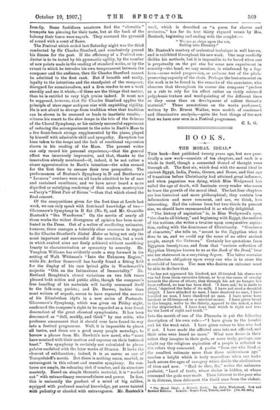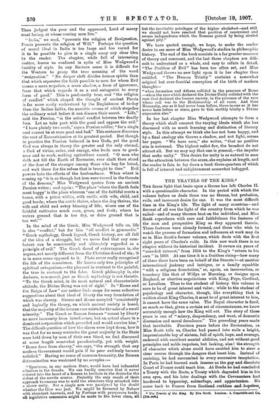BOOKS.
THE MORAL IDEAL.* Two book—first published twenty years ago, but now prac- tically a new work—consists of ten chapters, and each is a whole in itself, though a connected thread of thought runs through all. The first six, which deal with the moral ideal in
ancient Egypt, India, Persia, Greece, and Rome, and that ago of transition before Christianity had attained great influence,
and when paganism was dying, which Miss Wedgwood has called the age of death, will fascinate every reader who cares to trace the growth of the moral ideal. The last four chapters are less historical and more philosophical; they contain less information and more comment, and are, we think, less interesting. Had the volume been but two-thirds its present size, we should have recommended it as wholly delightful. "The history of aspiration" is, in Miss Wedgwood's eyes, " the clue to all history," and beginning with Egypt, the earliest of the nations, she writes a treatise upon comparative aspira- tion, ending with the dominance of Christianity. "Goodness of character," she tells us, "meant to the Egyptian what it does to us, and we could say the same of no other ancient people, except the Hebrews." Certainly her quotations from
Egyptian inscriptions, and from that "curious collection of Egyptian liturgies known to us as the Book of the Dead," bear out her statement in a surprising degree. The latter contains a confession obligatory upon every one who is to cross the
threshold of heaven. The man who desires an entrance must be able to declare that
"he has not oppressed his kindred, not ill-treated his slaves nor exaoted from them excessive labour, or been the cause of cruelty towards the slaves of others, that through his act no hunger has been suffered, no tear has been shed. • I have not,' he is made to plead, 'deprived the babe of its milk. I have not used a deceitful weight. I have attacked no man, I have deceived no man, I have terrified no man, I have slandered no man. I have never been insolent or ill-tempered or a mischief-maker. I have given bread to the hungry, water to the thirsty, apparel to the naked, a boat to the shipwrecked. I have done that which is right and true for the Lord of right and truth.'"
Into the mouth of one of the Pharaohs is put the following description of his own rule :—" I have given to the humble and let the weak exist. I have given valour to him who had it not. I have made the afflicted ones into not afflicted, and their cries were heard no more." What men desire in their rulers they imagine in their gods, or more truly, perhaps, one might say the religious aspiration of a people is reflected in the rulers they commend. A psalm "from one who lived at the smallest estimate more than three millenniums ago" reaches a height which is truly marvellous when one looks back across the ages of savagery which divide the civilisatiomt of then and now. "Hail to thee, Ra," writes the unknown psalmist, "Lord of truth, whose shrine is hidden, at whose command the gods were made. Thou listenest to the poor who is in distress, thou deliverest the timid man from the violent.
* The Moral Ideal a Historic Study. By Julia Wedgwood. New aM Revised Edition. London; Kegan Paul, Trench, and Co. [10e. 64. net.]
Thou judgest the poor and the oppressed, Lord of mercy most loving, at whose coming men live."
"India," we read, "presents the religion of Resignation, Persia presents the religion of Will." Perhaps the question of moral ideal in India is too large and too varied for it to be possible to give in a single essay any clear idea to the reader. The chapter, while full of interesting matter, leaves us confused in spite of Miss Wedgwood's lacidity of style. In any .Eastern sense it is difficult for the Western to grasp the true meaning of the word "resignation." "No deeper cleft divides human spirits than
that which. separates the faith possible to men for whom Evil means a mere negation, a mere shadow, a form of ignorance, from that -which regards it. as a real antagonist to every form of good." This is profoundly true, and "the religion of • conflict" which shaped .the thought of ancient Persia is far more easily understood by the Englishman of to-day than the Indian faiths, theoarcotic aroma of which stupefies the ordinary mind before it can discern their. secret. "Life," said the Persian, "is the actual conflict between two deadly foes. Let us take part with the good and oppose the evil" "I have plainly two souls," says a Persian soldier, "for a single soul cannot he at once good and bad." This sentence discovers the root of Zoroastrianism at its greatest period. But though in practice the Persian believed in two Gods, yet the good God was always in theory the greater and the only eternal,, a God of virtue, order, and energy, who leads men to good. ness and to work, making agriculture sacred. "0 man who cloth not till the Earth of Zoroaster, ever shalt thou stand at the door of the stranger among those who beg for bread, and wait there for the refuse that is brought to thee." Evil powers bate the efforts of the husbandman. When wheat is coming up "it is as though hot iron were turned in the throats of the demons," Miss Wedgwood quotes from an ancient Persian writer; and again : "The place 'whore the Earth feels most happy' is the place whereon 'one of the faithful erects a house, with a priest within, with cattle, with wife, child, and good herds; where the cattle thrive, where the dog thrives, the wife and child and evbiy blessing of life; where one of the faithful cultivates much corn, grass, and fruit; -where he waters ground that is too dry, or dries ground that is too wet."
In the mind of the Greek, Miss Wedgwood tells us, life' is also "conflict," but for him "all conflict is gymnastic." "Greek mythology, Greek legend, Greek history, are all full of the idea of a struggle, but we never find that any com- batant can be consistently and ultimately regarded as a principle of evil." The Greek dread of extravagance is, she argues, not merely different from the Christian dread of sin; it is in some sense opposed to it. Plato never really recognised the life of the conscience. He knows only two principles of spiritual antagonism,—the pleasant in contrast to the painful, the true in contrast to the false. Greek philosophy is, she declares, non-moral, just as Greek mythology is not theistic. "To the Greek mind, in its most natural and characteristic attitude, the Divine Being was out of sight." In "Rome and the Reign of Law" our author finds scope for some reflective suggestions about that ideal of liberty the very foundation of which was slavery. Greece and Rome accepted "consistently and logically the theory, on which ancient society is based, that the majority of the human race exists for the sake of a small minority." The Greek or Roman freeman "meant by liberty no mere immunity from interference, but an actual share in a dominant corporation which preceded and would survive him." The difficult question of how the slaves were kept down, bow it was that for so many centuries the great majority in the State
were held down by men of their own blood, we find discussed at some length somewhat paradoxically, yet with weight.
"Rome drew from slavery," she says, "the strength that any modern Government would gain if its poor suddenly became satisfied." Having no sense of common humanity, the Roman determination was weakened by no scruples :—
"Spartaeus, in any modern State, would have had influential admirers in the Senate. We can hardly conceive that it never entered into the heart of a Roman to hesitate in the desire for the defeat of the servile armies. Probably the only result of their approach to success was to weld the structure they attacked into a closer unity. Not a single arm was paralysed by the doubt whether the blow was just. We might be favoured by Nature' with abundant .harvests, and by Fortune with prosperous trade ; all legislative concession might be made to the lower class,, all, but the inevitable privileges of the higher abolished—and still we should not have reached that position of convenient and secure independence which the Romans gained by being steeled against pity.'
We have quoted enough, we hope, to make the reader desire to see more of Miss -Wedgwood's studies in philosophic history. The end of the book consists in a far greater measure of theory and comment, and the last three chapters are diffi- cult to understand as a whole, and easy to refute in detail. "The Problem of Evil" has been too often set, and Miss Wedgwood throws no new light upon it in her chapter thus entitled. "The Human Trinity" contains a somewhat original but over-fancifal conception of the birth of modern thought- " when Jerusalem and 'Athens collided in the presence of Rome —when the race which declared the Divine Unity collided with the race that declared the human variety, in the presence of the race whose call was to the Illediatorship of all races. And thus Humanity, one as it had never been before, three-in-one as it has never been before or since, gave to this .earthly trinity a Divine expression also."
In her last chapter Miss Wedgwood attempts to form a theory which shall connect the varying ideals which she has discussed with so much learning and distinction of literary style. In this attempt we think she has not been happy, and by a final analogy she throws a shadow, and not light, across her pages. "We have seen," she writes, "that no positive aim is universal. The highest enlist few, the broadest do not attract all. But we may say that one is general,—the impulse that seeks unity." This desire for unity is as natural to man as the attraction between the sexes, she explains at length, and the reader is fain to lay down a book three-quarters of which is full of interest and enlightenment somewhat befogged.











































 Previous page
Previous page